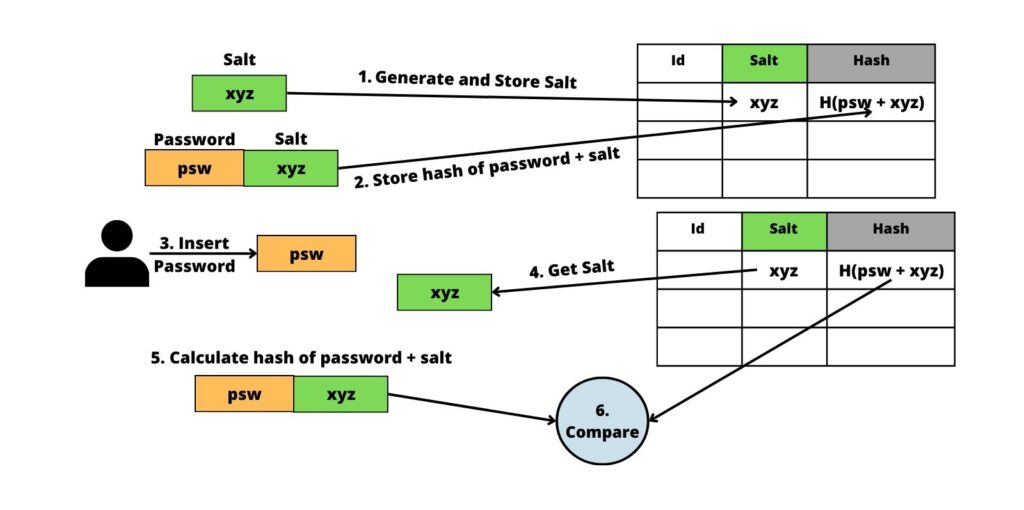In today’s digital age, safeguarding user data, especially passwords, is paramount. When it comes to the critical task of storing passwords in a database, it’s imperative to move beyond insecure practices such as storing passwords in plain text or relying solely on hashing, which has its limitations. This article will delve into the best practices for securely store passwords in database, emphasizing the crucial role of salting to enhance security and protect user data from potential threats.
- The Risks of Storing Passwords in Plain Text:
- Discuss the inherent risks of storing passwords in plain text.
- Emphasize the vulnerability of passwords to internal breaches.
- Hashing Alone is Not Enough:
- Explain why relying solely on hashing is insufficient.
- Introduce the concept of pre-computation attacks that can compromise hashed passwords.
- The Role of Salting:
- Define what a salt is and its purpose in password security.
- Highlight how salts contribute to uniqueness and complexity.
- Salting Process:
- Break down the salting process step by step.
- Clarify that the salt is stored in plain text, emphasizing its unique association with each password.
- Storing Salt in the Database:
- Discuss the decision to store the salt in the database.
- Explain how this allows the system to retrieve the correct salt during login.
- Password Storage and Validation:
- Detail the hashing process when storing passwords in the database.
- Explain how the system validates passwords during login by combining the salt with the entered password.
- Unique Salts for Each User:
- Emphasize the importance of associating a unique salt with each user’s password.
- Highlight that even users with the same password will have different hash values due to unique salts.
- Enhanced Security Measures:
- Discuss how salting provides an additional layer of security.
- Mention the resilience against rainbow table attacks and other common password-cracking techniques.

Conclusion: In conclusion, the article reinforces the significance of salt in password security. It emphasizes the importance of using unique salts for each user to enhance the complexity of hashed passwords. By following these best practices, organizations can significantly improve the security of their stored passwords.
Read About: Decoding SQL Joins: A Comprehensive Guide to Enhance Your Database Skills.
Frequently Asked Questions
- Q: Why is storing passwords in plain text a bad idea?
- A: Storing passwords in plain text poses a security risk, as anyone with internal database access can view and misuse them.
- Q: Is hashing passwords alone sufficient for security?
- A: No, hashing alone is not enough, as pre-computation attacks can compromise hashed passwords.
- Q: What is the purpose of using a salt in password security?
- A: A salt adds randomness and uniqueness to passwords during hashing, preventing vulnerabilities to common attacks.
- Q: How is the salt uniquely associated with each user’s password during storage?
- A: The salt is stored in plain text in the database, ensuring a distinct hash result for each password.
- Q: What is the process of storing and validating passwords using salt?
- A: The salt is combined with the password during hashing, and the computed hash values are compared during validation.
- Q: Why is it crucial to store the salt in the database?
- A: Storing the salt allows the system to retrieve the correct salt during login, ensuring accurate password validation.
- Q: How does salting contribute to the uniqueness of hash values?
- A: Each user’s password has a unique salt, resulting in different hash values even for users with the same password.
- Q: Can salting protect against rainbow table attacks?
- A: Yes, salt adds complexity, making it significantly more challenging for attackers to use precomputed tables.
- Q: What role does salt play in enhancing password security measures?
- A: Salt provides an additional layer of security, improving resilience against various password-cracking techniques.
- Q: How does salting contribute to safeguarding user data in the digital age?
- A: In the digital age, salting is crucial for enhancing the security of stored passwords, preventing unauthorized access and breaches.